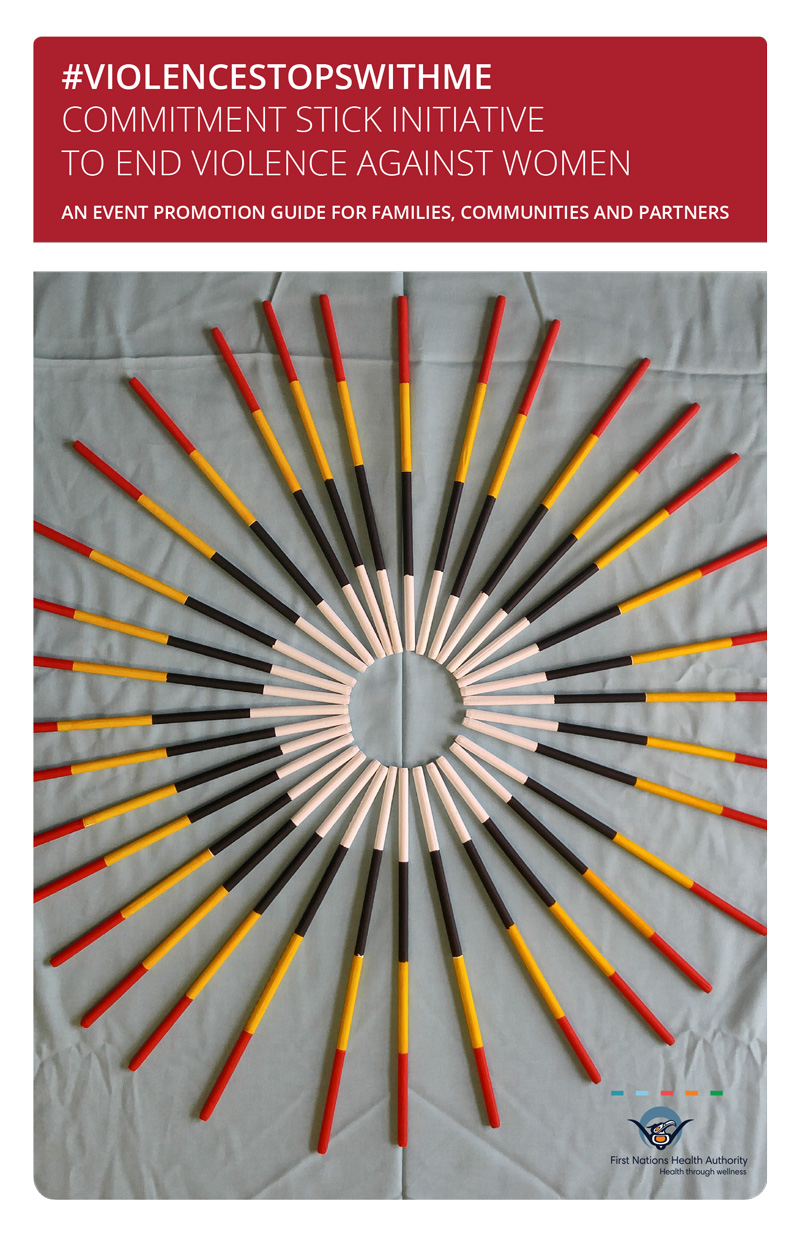The work is not done yet. Commitment Stick grant renewal to support First Nations healing
Community-driven initiatives support ending violence against Indigenous women and girls

Recent events in BC draw attention to the ongoing need for community-driven support and safety for women and girls. To promote resilience and healing, all five First Nations Health Authority (FNHA) regions are re-opening applications for $1,000 Commitment Stick grants to hold events or ceremonies to end violence against Indigenous women and girls.
"Do not be silenced. News and media reports of recent events, including the identification of human remains of Traci Genereaux and charges for the murder of Pamela Napoleon remind us that we must be diligent and committed to stop violence against women every day," says Chief Charlene Belleau of Esk'etemc First Nation. "Keep our Commitment Sticks staked solid to the ground every day, empower our Indigenous women and girls to be strong and powerful women within our nations. The future of our Nations is at stake with every murdered and missing Indigenous woman or girl."
The Esk'etemc (Alkali Lake) Commitment Stick initiative was launched November 2016 to end all forms of violence against women and girls, and is premised on the idea that First Nations must be involved in their own healing. FNHA will provide $1,000 event grants to support any First Nation prepared to tackle this issue at home. These grants are open to communities who may already have hosted events.
"Our people coming together, we are gathering in our territories to tell truths," says Joe Gallagher, Chief Executive Officer, FNHA. "We know this work is not finished and there is much we need to do to support Indigenous women and girls, be strong allies, and stop violence and unsafe behaviours in their tracks."
The idea of the Commitment Sticks started with Esk'etemc Elder Fred Johnson Sr., with the support of Chief Charlene Belleau. Esk'etemc Commitment Sticks are symbols of a personal commitment to live violence-free and to actively stop violence against Indigenous women and girls.
"Four generations of my family have experienced violence, sexual assaults and abuse at the hands of men and women. Creating safety for children, women and vulnerable adults starts in our own backyards," says Grand Chief Doug Kelly, Chair of the FNHC. "I implore the men and women in positions of power to do something. Great grandparents, grandparents, aunties and uncles must keep an eye on their children and vulnerable adults to keep their family members safe."
At Gathering Wisdom in May 2015, over 120 Chiefs and leaders took up the Esk'etemc Commitment Sticks and pledged to work together to end violence against Indigenous women and girls in First Nations communities. This commitment was renewed by community leaders in a ceremony held last year at Gathering Wisdom VIII.
Application deadlines are:
North – December 15, 2017
Vancouver Island – December 1, 2017
Interior – December 1, 2017
Fraser Salish - December 1, 2017
Vancouver Coastal – December 1, 2017
Learn more about the Commitment Sticks and apply for your community grant here: http://www.fnha.ca/wellness/commitment-stick
Background
Holding a community Commitment Stick event
Projects must support ending violence against Indigenous women and girls and can include but are not limited to community events, ceremonies, meetings and activities, such as:
> Healing circles or ceremonies,
> Women’s gatherings or feasts,
> Support groups for survivors and families,
> Educational programs, | > Initiatives for men and other allies,
> Search parties,
> Community art projects.
|
Grant funding can cover Commitment Stick event costs including but not limited to: catering, advertising, transportation, honoraria, speakers and facilitators, search expenses, etc.
Supporting Indigenous women starts at home. How to be a good ally to the women and girls in your life:Believe them. This is the most important first step. Ongoing harassment, assault and abuse are real. Let's not argue with this fact.
Amplify their voices. Women's perspectives aren't always heard, and this can be an opportunity to listen. Don't support conversations that question women's honesty or integrity. Allow women to speak and help create space for that if needed.
Stand up for them. You have the power to stop unsafe behaviour while it's happening. Don't allow your male friends, colleagues or family members to make derogatory or sexualized remarks about women or girls in your presence. If you are uncomfortable causing conflict in a group, have the conversation with the person who made the comment later, in private.
Support them. There is help out there.
• Connect your friend or loved one with the KUU-US Crisis Line, which provides culturally safe support services 24 hours a day at 1-800-588-8717.
• FNHA also offers short-term crisis counselling services through our Health Benefits program. On-reserve clients can contact their band office for mental wellness services. Clients living off-reserve can contact Health Benefits at 1-800-317-7878 for crisis intervention benefits.
• Residential school survivors and intergenerational survivors can also access free professional counselling by calling 1-877-477-0775.
Application Forms
right-click and save as
NorthernInterior
Fraser Salish
Vancouver Coastal
Download this statement in PDF format here (PDF 132 KB)
